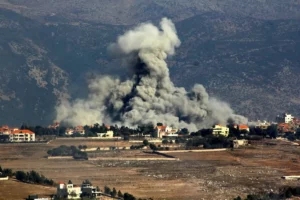President Kais Saied’s tirade against sub-Saharan African migrants is just his latest assault on democracy
I was relieved when Hervé, a young man from Ivory Coast who occasionally helps me around the house, finally called. It had been four agonising days of radio silence. Since his landlady had evicted him, he had been wandering the streets of Raoued, a suburb of Tunis, trying to avoid the marauding gangs. This was right after President Kais Saied had delivered an incendiary speech against migrants from sub-Saharan Africa.
I asked Hervé why he hadn’t called me for help. He said he had heard the police were threatening to punish those who help black migrants and didn’t want to get me into trouble.
A poisonous atmosphere has descended on Tunisia. On 21 February, at a national security council meeting, Saied launched a tirade against black immigrants, whom he blamed for “violence, crimes and unacceptable acts”. He claimed that “successive waves of illegal immigration” were part of a secret plot to dilute Tunisia’s Arab-Islamic identity into “a purely African country”.
He said: “A criminal plan has been set up since the beginning of this century to alter the demographic structure of Tunisia and certain parties received loads of money to enable the occupation of irregular sub-Saharan migrants in Tunisia.”
This language is inspired by the “great replacement theory”, an extreme racist conspiracy theory that claims that majority white populations are being deliberately replaced by non-European immigrants. It is profoundly depressing, considering Tunisia’s recent victories for equality.
The history of black Africans in Tunisia is fraught. After all, the history of black communities in north Africa is connected to the slave trade. Tunisia became the first Arab country to ban slavery in the 19th century, but its legacy can still be seen in Arabic slurs that refer to black people as slaves. It was the 2011 revolution that finally gave a chance for this often silenced and oppressed minority to be heard.
In the past decade, we have held free and fair elections, drafted a progressive constitution, and built a thriving civil society. All this is imperilled by the incessant assaults on democracy by Saied.
Why is Saied spouting this racial hatred? Partly, it is his strategy to divert attention from Tunisia’s increasing economic woes. Recently, we witnessed some Tunisian politicians blame Africans for a shortage of rice and for stealing jobs.
But another reason is the country’s agreement with Italy, which between 2011 and 2022 gave Tunisia €47m to control its borders and migratory flows.
I offered Hervé money – assuming he was struggling to find work amid the new hostile environment – but he refused. To save his pride, I told him to consider it an advance for a future job, which he accepted.
While on the phone, I quizzed him about the rising tide of intolerance, and he reeled off story after story of unspeakable bigotry and violence against his community. He sent me videos of assaults. I was filled with shame.
On 5 March, the president took measures to allay the situation, but it was too late because the damage was done.
Two days after we spoke, Hervé offered to clean my house. No taxi would agree to take him, clearly fearing official reprisal. A shared taxi agreed to “smuggle him” – as if he was a refugee crossing a border – and indicated that a premium rate would apply. We eventually gave up.
Anyone who has watched Saied’s hijacking of the country is sadly not surprised. Since the summer of 2021, when he suspended parliament and started ruling by decree, he has menaced the judiciary, muzzled the press, investigated his opponents and made numerous arrests. Last month, I was summoned by a judge and told I was banned from leaving the country.
In 18 months, he has torched every liberal institution Tunisians have painstakingly built in the 11 years since the overthrow of the former president Zine al-Abidine Ben Ali. A dictatorship has been built in the birthplace of the Arab spring and the silence from the world is deafening.
This vile demagoguery is not just an insult to human rights, it is also harming Tunisia’s international reputation and economy. In February the African Union cancelled a scheduled conference, weeks after urging the country to refrain from using racist hate speech. The World Bank announced it was pausing talks with Tunisia.
Days passed but Hervé did not reply to my calls. I was worried sick thinking he had been arrested or worse. Finally, one morning he rang. “I’m at the airport. I’m going back home to Abidjan. Tunisia doesn’t want us any more,” he said.
He asked me to turn on the camera to say goodbye. His beautiful smile shone out in defiance against this avalanche of gratuitous violence.
“It’s OK,” he said. “We also met good people here, like you.” I had to hold back the tears of helplessness.
Source : The Guardian

















Add Comment